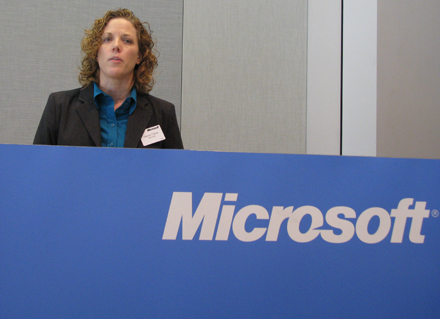April launch for Microsoft's Azure

Microsoft Australia said today that it would locally launch its cloud-based Azure platform in April.

Microsoft's Dianne O'Brien
(Credit: Ben Grubb/ZDNet.com.au)
Previous reports had suggested the service would be launched today; however, Microsoft senior director of business strategy Dianne O'Brien said that Azure would become available for Australians in April.
Microsoft Azure will offer applications and services over the cloud. Microsoft services to be offered at launch include Exchange, SQL and SharePoint. Storage hosting will also be available.
Pricing was not disclosed, but would be revealed "over the next few weeks" and be similar to US pricing, according to O'Brien.
In the US, pricing for computer power sits at US$0.12 an hour, although that could vary depending on instance size. Storage is US$0.15 per gigabyte per month or US$0.10 per 10,000 storage transactions.
Azure customers could also make use of SQL databases as needed with a "web edition" offered at US$9.99 per month and a "business edition" at US$99.99 per month. This pricing would be similar in Australia. There were also discount offers depending on users' purchasing habits.
An estimate of pricing for data transfer in Asia-Pacific was US$0.30 for inbound traffic and US$0.45 for outbound, according to the company. In the US, customers pay significantly less, paying US$0.10 for inbound traffic and US$0.15 for outbound. The higher premium for the Asia-Pacific region were because bandwidth rates were higher to that in the US, according to O'Brien.
Exchange rates would be "taken into account" when figuring out how much to charge Australians for the service, O'Brien said. "I can't say that it'll be an absolute spot on rate at the point in time [when the product is released]."
Microsoft said datacentres hosting the cloud offerings would be located in Singapore and Hong Kong for the Asia-Pacific region. Microsoft did not disclose whether it had partnered with datacentre providers or whether it had built its own datacentres in each region.
"We typically don't get into those details," O'Brien said, responding to media questions. She said that even if Microsoft used a partner's datacentre, the important thing was that it applied the same physical access security principles and held itself accountable for those standards.
One journalist at the launch questioned Microsoft over whether it could be trusted with cloud services considering the recent Sidekick outage leaving Sidekick mobile users without data for days.
"We make multiple copies of customer's data," she said. "So it's much more resilient of a major outage."
Microsoft's O'Brien said that Microsoft was looking at replication of data between region's datacentres. "Overtime we'll also geo-replicate — we'll actually replicate that data between datacentres. So I think [that] those two things together put us in a strong position relevant to data safety," O'Brien said.
One of the big questions hanging over the success of the offering was whether independent software vendors (ISVs) will develop their applications to be compatible with Azure, according to IBRS analyst Joseph Sweeney.
"Who has the biggest ISV market in the world currently? Who really owns the market? Microsoft," Sweeney said.
"They've got a fantastic [ISV] network. They did a bit of damage [to it] over the past few years — up until a couple of years ago — they were doing pretty poorly with maintaining it; they've reversed that. But don't underestimate the fact that they've got this massive ISV infrastructure and with that that means a lot of people who are very familiar with Microsoft technologies have a vested interest in protecting that.
"I'm not convinced that Microsoft are going to win because of that [but] they need them [the ISVs]," Sweeney said.
Another issue, Sweeney said, was what jurisdiction data was stored in.
"You've got one geography that's got British law that's controlled by the Chinese Government [Hong Kong] and you've got the other one that's controlled by Singaporean law," Sweeney said.
The indicative pricing, as it currently sat, was "convoluted", he said.
"They need to price in this way but I'm not sure Microsoft has done a good enough job of simplifying that licensing model," Sweeney said.